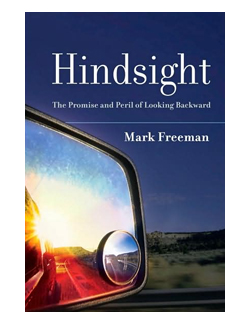| Sun | Mon | Tue | Wed | Thu | Fri | Sat |
|---|---|---|---|---|---|---|
| 1 | 2 | 3 | 4 | 5 | ||
| 6 | 7 | 8 | 9 | 10 | 11 | 12 |
| 13 | 14 | 15 | 16 | 17 | 18 | 19 |
| 20 | 21 | 22 | 23 | 24 | 25 | 26 |
| 27 | 28 | 29 | 30 | 31 |
CATEGORIES
RECENT ENTRIES
BLOG ROLL
Retrospection
 The plot twists that shaped the narrative of Mark Freeman’s life were not instantly recognizable as important moments. Consider the car ride home from college with his father that still resonates 35 years later. Their four-hour conversation only took on such significance two months after it happened, when Freeman's father died of a heart attack.
The plot twists that shaped the narrative of Mark Freeman’s life were not instantly recognizable as important moments. Consider the car ride home from college with his father that still resonates 35 years later. Their four-hour conversation only took on such significance two months after it happened, when Freeman's father died of a heart attack.
Today Freeman, PhD’86, considers that road trip a central episode in his life story. He finds comfort in the recollection of time they had together but also a melancholy shadow of what their relationship might have become. “What my dad’s death seemed to do was activate the poetic function of memory, such that I would return to that ride home and try to disclose what was there, waiting," Freeman writes in Hindsight: The Promise and Peril of Looking Backward (Oxford University Press, 2010).
When his daughter suffered a serious illness, the memory of that ride and his father’s death shortly thereafter sharpened Freeman’s awareness of moments with her and heightened his sense that life could be cut suddenly short. “What we are doing is remembering and narrating,” Freeman writes, “which means situating the experiences of the past in relation to what has happened since.”
A psychology professor at the College of the Holy Cross, Freeman explores how hindsight, often dismissed as a biased view of the past, also offers a path to insight, a way to create order from the messy course of events. Those events can be matters of life and death, or as trivial as a baseball game, as Steve Bartman discovered when he became a character in one such narrative in 2003.
Bartman’s fateful lunge for a foul ball was a minor incident among many that contributed to the Chicago Cubs losing in the playoffs that year. Yet it became a central storyline, symbolic of a cursed franchise’s suffering fate. Had the Cubs won, Bartman might have been forgotten, like Freeman’s car ride might have been had his father lived longer.
Many Cubs fans made Bartman an immediate villain, targeting him with beer cups and other projectiles, but the historical significance of his action depended on the outcome of the series. Although Freeman describes Bartman as a victim of the human craving for narrative, he argues that there are truths revealed in those retrospective stories that cannot be identified in the chaos of the moment. In Bartman's unfortunate case the "truth" about his role transcends the "fact" that many on-field mistakes contributed to the outcome.
Freeman insists that the public singling out Bartman, despite the many other factors involved, is not a distortion. "[T]he question of What Really Happened is not a matter of facts alone. Indeed, I would go so far as to say that we do not, and cannot, know What Really Happened until there is an ending. This is the way of narrative, and it is every bit as real as the events that happen along, clock ticking all the while."
Bartman's greatest mistake might have been losing himself in the moment. As he noted in his written apology to Cubs fans, if he had been conscious of his potential to cause harm, he never would have reached for that foul ball. Such hindsight—if only I had thought it through—can be a mechanism to prevent more than fan interference; it can lead to insight that encourages more ethical behavior.
Acting first and thinking later often exposes moral failings, leading to regret that is more private but no less profound than Bartman's. In that realm, Freeman writes, the act of "narrative reflection" becomes more than a way to shape the stories of our lives. The process "emerges as a potential vehicle not only of truth but goodness," adding perspective that helps produce better endings.
Perceived "endings" are themselves subject to change. Information gleaned years later can alter a person's experience. Life stories are not static, Freeman writes, even in retrospect. “We are neither the archaeologists of our histories, unearthing what had been there all along, nor their inventors, fashioning them ex nihilo, out of nothing. Not unlike poets, we are creators, fashioning and refashioning the work that is our lives, through narrative, via hindsight.”
Jason Kelly
February 22, 2010
